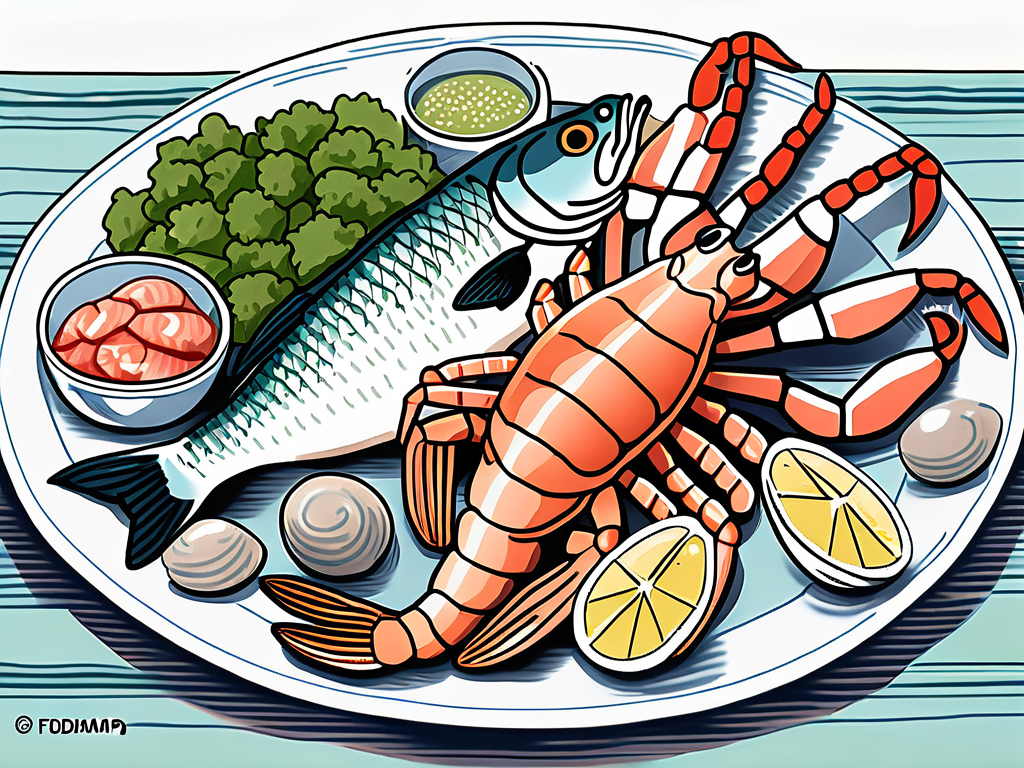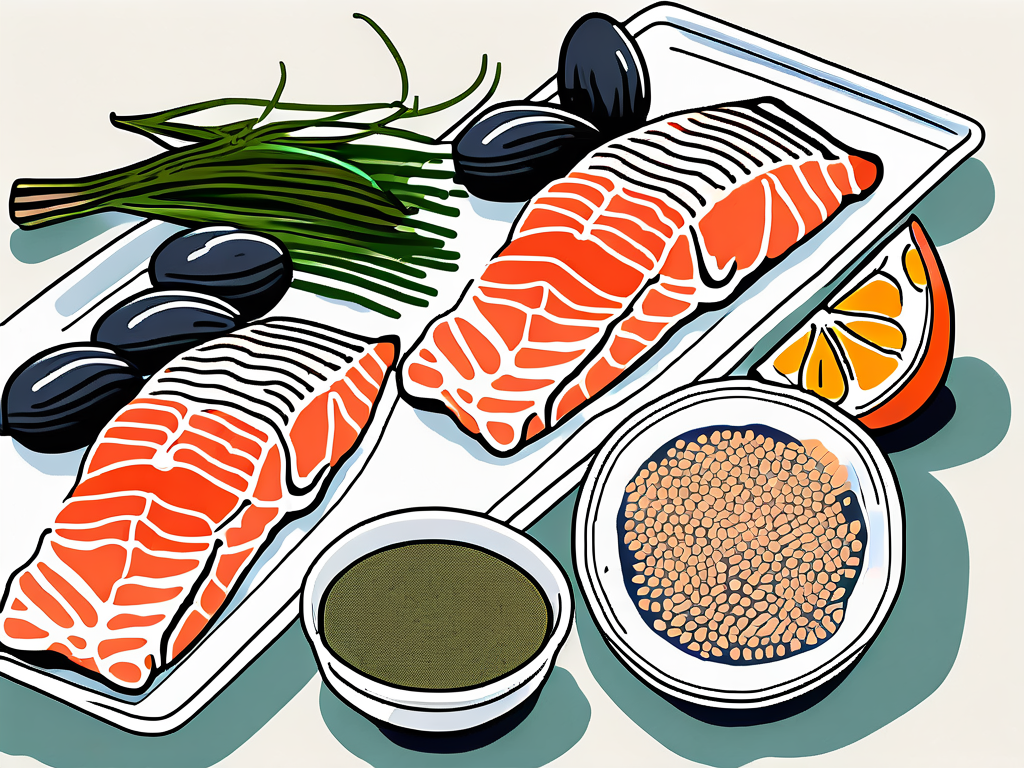Seafood is a popular choice for many people, thanks to its delicious taste and numerous health benefits. However, if you're following the low FODMAP diet, you might be wondering if seafood is a suitable option for you. In this article, we will delve into the relationship between seafood and FODMAPs, explore the different types of seafood and their FODMAP levels, discuss how to prepare low FODMAP seafood meals, and examine the impact of seafood on digestive health.
Understanding FODMAPs
Before we dive into the world of seafood and FODMAPs, let's take a moment to understand what FODMAPs actually are. FODMAPs stands for Fermentable Oligosaccharides, Disaccharides, Monosaccharides, and Polyols. These are specific types of carbohydrates that can be difficult for some people to digest. When FODMAPs reach the large intestine undigested, they can cause symptoms such as bloating, gas, abdominal pain, and diarrhea in individuals with sensitive digestive systems.
It's important to note that not all carbohydrates are considered FODMAPs. For example, long-chain carbohydrates like starches are generally well-tolerated by most individuals. However, the short-chain nature of FODMAPs makes them more likely to ferment in the gut, leading to the uncomfortable symptoms experienced by some people.
What are FODMAPs?
FODMAPs are found in a wide variety of foods, including fruits, vegetables, grains, dairy products, and, yes, even seafood. These short-chain carbohydrates can sometimes wreak havoc on the digestive system, but following a low FODMAP diet can help manage these symptoms and improve overall gut health.
Interestingly, the FODMAP content in foods can vary widely. For example, while some fruits like apples and pears are high in FODMAPs, others like bananas and berries are considered low FODMAP options. This variability underscores the importance of individualized dietary approaches when managing digestive issues.
Why are Low FODMAP Diets Important?
Low FODMAP diets have gained popularity in recent years due to their effectiveness in reducing symptoms of irritable bowel syndrome (IBS) and other digestive disorders. By eliminating or limiting high FODMAP foods, individuals can pinpoint their triggers and alleviate uncomfortable symptoms. For those who love seafood, understanding the FODMAP content in different types of seafood is crucial.
Moreover, research continues to uncover the intricate relationship between gut health and overall well-being. The gut microbiome, which plays a key role in digesting FODMAPs, has been linked to various aspects of health, including immune function and mental health. By paying attention to FODMAP intake and its effects on the gut, individuals can take proactive steps towards improving their quality of life.
The Relationship Between Seafood and FODMAPs
Seafood, like other food categories, can contain varying levels of FODMAPs. It is important to note that not all seafood is high in FODMAPs, and there are plenty of options that can be enjoyed even on a low FODMAP diet.

When it comes to seafood and FODMAPs, it's crucial to understand that while many types of seafood are generally considered low in FODMAPs, there are factors that can influence the FODMAP content in these marine delights. By being mindful of these factors, individuals following a low FODMAP diet can make informed choices when it comes to incorporating seafood into their meals.
General FODMAP Content in Seafood
On average, most types of seafood are considered low in FODMAPs. This means that they are generally safe to consume for individuals following a low FODMAP diet. However, it is essential to be aware of specific factors that can affect the FODMAP levels in seafood.
Seafood such as fish, shrimp, crab, and lobster are typically low in FODMAPs, making them suitable options for those with sensitivities to these fermentable carbohydrates. These protein-rich choices not only provide essential nutrients but also offer a wide range of culinary possibilities for individuals looking to diversify their low FODMAP diet.
Factors Affecting FODMAP Levels in Seafood
While seafood is typically low in FODMAPs, certain factors can influence the FODMAP content of seafood. One such factor is the cooking method. For example, deep-frying seafood can increase its FODMAP levels, whereas grilling or steaming are better options for keeping FODMAPs at bay. Additionally, marinades or sauces used in seafood preparations should be checked for high FODMAP ingredients such as garlic or onion.
Another factor to consider is the portion size of seafood consumed. While most seafood is low in FODMAPs, consuming large quantities in one sitting may still trigger symptoms in individuals with FODMAP sensitivities. It's important to practice portion control and monitor individual tolerance levels when incorporating seafood into a low FODMAP diet.
Types of Seafood and Their FODMAP Levels
Shellfish and FODMAPs
Shellfish, including shrimp, lobster, crab, and clams, are generally low in FODMAPs. These seafood options can be enjoyed without worrying too much about triggering digestive symptoms. However, it's always important to listen to your body and pay attention to individual tolerance levels. The key is to opt for fresh, unprocessed varieties and prepare them using low FODMAP ingredients and cooking techniques.

When it comes to shellfish, it's worth noting that while they are generally low in FODMAPs, individuals with a known shellfish allergy should exercise caution. Allergies to shellfish can range from mild reactions like hives and itching to severe symptoms such as anaphylaxis. If you suspect you have a shellfish allergy, it's crucial to consult with a healthcare provider for proper testing and guidance on safe seafood consumption.
Fish and FODMAPs
Fish is another excellent seafood choice for those following a low FODMAP diet. Luckily, most fish, such as salmon, tuna, and cod, contain minimal FODMAPs. These nutrient-rich options can be baked, grilled, or pan-fried with low FODMAP seasonings to create delicious and gut-friendly meals.
In addition to being low in FODMAPs, fish is also a great source of omega-3 fatty acids, which have been linked to numerous health benefits, including reducing inflammation and improving heart health. Incorporating fish into your diet regularly can be a tasty way to boost your intake of these essential nutrients. To maximize the nutritional benefits, aim to consume a variety of fish species to ensure a diverse array of nutrients in your diet.
Preparing Low FODMAP Seafood Meals
Choosing the Right Seafood
When it comes to preparing low FODMAP seafood meals, choosing the right seafood is crucial. Fresh and unprocessed options are generally safer choices. It is also important to avoid processed seafood products that may contain high FODMAP ingredients such as breadcrumbs, marinades, or sauces.

Opting for seafood that is rich in omega-3 fatty acids, such as salmon, mackerel, or sardines, can provide additional health benefits while being low in FODMAPs. These fatty acids are known for their anti-inflammatory properties and can support overall gut health. When selecting shellfish, sticking to varieties like shrimp, crab, or lobster can also be a good low FODMAP choice.
Cooking Techniques for Low FODMAP Seafood
To maximize the benefits of low FODMAP seafood, it's essential to employ cooking techniques that minimize the addition of FODMAPs. Grilling, baking, broiling, and steaming are great options that preserve the natural flavors of seafood without adding unnecessary ingredients. Avoiding deep-frying or using high FODMAP sauces will help keep your meals gut-friendly and enjoyable.
Marinating seafood in low FODMAP ingredients such as lemon juice, olive oil, herbs, and spices can enhance the flavor profile without triggering digestive issues. Additionally, incorporating low FODMAP side dishes like quinoa, green beans, or roasted potatoes can complement your seafood meal while providing a well-rounded and satisfying dining experience.
The Impact of Seafood on Digestive Health
Benefits of Seafood for Gut Health
Seafood is not only a delicious addition to our plates but can also have a positive impact on our digestive health. The omega-3 fatty acids found in fish, such as salmon and tuna, have been shown to reduce inflammation and promote gut health. Additionally, seafood is rich in essential vitamins and minerals that support overall well-being.
Moreover, seafood is a great source of high-quality protein, which is essential for maintaining muscle mass and supporting various bodily functions. The amino acids present in seafood help in repairing tissues and building enzymes that aid in digestion. Including seafood in your diet can also contribute to a healthy weight management plan, as it is typically lower in saturated fats compared to other protein sources.
Potential Risks of Seafood Consumption
While seafood can offer numerous health benefits, it is essential to be aware of potential risks associated with seafood consumption. Some individuals may be allergic to certain types of seafood, which can lead to adverse reactions. It is important to consult with a healthcare professional if you have any concerns or known allergies before incorporating seafood into your diet.
Furthermore, the environmental impact of seafood consumption is a growing concern. Overfishing and unsustainable fishing practices can deplete marine resources and harm aquatic ecosystems. By choosing seafood that is sustainably sourced and supporting fisheries with responsible practices, consumers can help protect marine biodiversity and ensure a healthier ocean for future generations.
As with any dietary choices, it is crucial to listen to your body and make informed decisions that support your overall well-being. Seafood can be a wonderful addition to a low FODMAP diet, providing a plethora of nutrients while keeping digestive symptoms at bay. By understanding which types of seafood are low in FODMAPs, how to prepare them using low FODMAP ingredients and techniques, and being mindful of individual tolerance levels, you can confidently enjoy seafood without compromising your gut health.